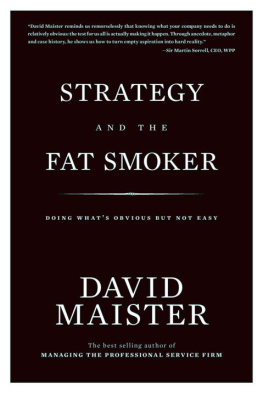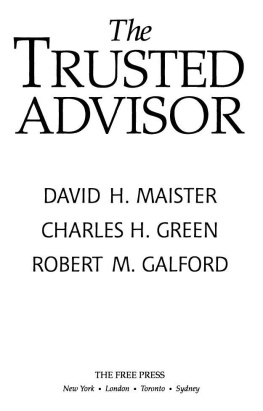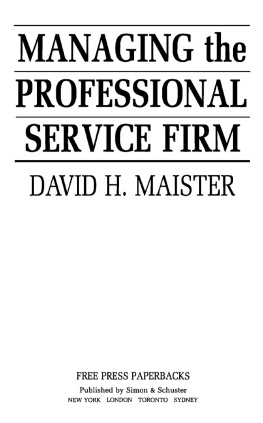David H. Maister - Strategy and the Fat Smoker; Doing Whats Obvious But Not Easy
Here you can read online David H. Maister - Strategy and the Fat Smoker; Doing Whats Obvious But Not Easy full text of the book (entire story) in english for free. Download pdf and epub, get meaning, cover and reviews about this ebook. year: 2009, genre: Business. Description of the work, (preface) as well as reviews are available. Best literature library LitArk.com created for fans of good reading and offers a wide selection of genres:
Romance novel
Science fiction
Adventure
Detective
Science
History
Home and family
Prose
Art
Politics
Computer
Non-fiction
Religion
Business
Children
Humor
Choose a favorite category and find really read worthwhile books. Enjoy immersion in the world of imagination, feel the emotions of the characters or learn something new for yourself, make an fascinating discovery.
- Book:Strategy and the Fat Smoker; Doing Whats Obvious But Not Easy
- Author:
- Genre:
- Year:2009
- Rating:5 / 5
- Favourites:Add to favourites
- Your mark:
- 100
- 1
- 2
- 3
- 4
- 5
Strategy and the Fat Smoker; Doing Whats Obvious But Not Easy: summary, description and annotation
We offer to read an annotation, description, summary or preface (depends on what the author of the book "Strategy and the Fat Smoker; Doing Whats Obvious But Not Easy" wrote himself). If you haven't found the necessary information about the book — write in the comments, we will try to find it.
Strategy and the Fat Smoker; Doing Whats Obvious But Not Easy — read online for free the complete book (whole text) full work
Below is the text of the book, divided by pages. System saving the place of the last page read, allows you to conveniently read the book "Strategy and the Fat Smoker; Doing Whats Obvious But Not Easy" online for free, without having to search again every time where you left off. Put a bookmark, and you can go to the page where you finished reading at any time.
Font size:
Interval:
Bookmark:

"David has a knack of explaining what is really going on around us in our business life in a way which brings clarity and insight to the issues. His long experience in the professional services sector shines through. David doesn't let anyone off the hook in his evaluation of where professional service firms often go wrong. He forces us to confront the real issues of lack of resolve, leadership, values and trust which so often hold firms back. This is a book which all those with an interest in how professional service firms should be managed and led should read'
-DAVID MORLEY, MANAGING PARTNER, ALLEN & OVERY
"David Maister is both smart and wise in this book. He employs commonsense but rarely-encountered lessons from the personal lives of humans to inform the strategy and management of professional services firms'
-TOM DAVENPORT, PROFESSOR AND DIRECTOR OF RESEARCH, BABSON
EXECUTIVE EDUCATION, BABSON COLLEGE, AUTHOR OF THINKING FORA LIVING
"With liberal doses of insight and humor, Maister demonstrates that strategy cannot and should not be reduced to a formula. This book shows us that what are critical are the human elements of leadership, motivation and personal fulfillment'
-JEFF SWYSTUN, DIRECTOR OF GLOBAL COMMUNICATIONS, DDB WORLDWIDE
"This is an inspirational collection of articles, full of insights and ideas you want to use at the first opportunity or send to your colleagues. A thoroughly rewarding read and certainly good for you'
-MARK READ, DIRECTOR OF STRATEGY, WPP
DOING WHAT'S OBVIOUS BUT NOT EASY
DAVID MAISTER
TO KATHY
I
 s I explain in the title chapter of this book, we often (or even usually) know what we should be doing in both personal and professional life. We also know why we should be doing it and (often) how to do it. Figuring all that out is not too difficult.
s I explain in the title chapter of this book, we often (or even usually) know what we should be doing in both personal and professional life. We also know why we should be doing it and (often) how to do it. Figuring all that out is not too difficult.
What is very hard is actually doing what you know to be good for you in the long-run, in spite of short-run temptations.
The same is true for organizations. In 2000, Pfeffer and Sutton explored the gap between knowing what to do and actually doing it in a terrific book called The Knowing-Doing Gap. I explore the same phenomenon, but from different perspectives.
In the past two-and-a-half decades, I have been trusted to see a large number of strategic plans from a wide variety of professional firms around the world, including direct competitors. What is immediately noteworthy is how similar (if not identical) they all are.
This is not because anyone is being stupid, but because everyone is smart. Every competitor is smart enough to analyze the market and spot which sectors are growing and which are in decline. Few competitors get it wrong. Everyone-absolutely everyone-can see which services and products are "hot" and which are becoming commodities.
What is more, everyone understands the basics of business success: provide outstanding client service, act like team players, provide a good place to work, invest in your future. No sensible firm (or person) would enunciate a strategy that advocated anything else.
The words and slogans may change over the years (from "Outstanding Client Care; to "Trusted Advisor, to "Loyalty" or "Client-Centricity; for example), but the underlying ideas remain the same around the world, over time, and from competitor to competitor.
However, just because something is obvious doesn't make it easy. Real strategy lies not in figuring out what to do, but in devising ways to ensure that, compared to others, we actually do more of what everybody knows they should do.
This simple insight, if accepted, has profound implications for:
1. how organizations should think about strategy
2. how they should think about clients, marketing, and selling
3. how they should think about management
Real strategy lies not in figuring out what to do, but in devising ways to ensure that, compared to others, we actually do more of what everybody knows they should do.
As a general outline, that's how this book is organized.
Chapters 1 through 5 are explicitly about strategy: what strategy is and how individuals and organizations should go about developing their strategies.
Chapters 6 through 8 dig more deeply into an aspect of strategy frequently advocated but seldom achieved: excellence in client relationships.
Chapters 9 through 14 are about management: how organizations can run themselves to overcome the barriers and temptations of the Fat Smoker syndrome.
In the final section "Putting it Together,"-chapters 15 through 19-I examine some of the barriers to organizational cohesion, the policies of some widely admired firms and, finally, offer some summary thoughts about what it takes to stay true to your strategic goals and ambitions.
The chapters in this book were written (and made available on my website) between 2005 and 2007. However, with one or two exceptions, this book represents their first appearance in print. While originally written as separate articles, I have tried here to integrate my arguments into a coherent flow Nevertheless, it does not have to be read at one sitting from beginning to end. Feel free to "dip into" the book at any point, according to the sections and chapters that seem of greatest interest to you.
This title chapter for the book establishes the themes that I will explore throughout the book. The key lesson is that, individually and collectively, knowing that something is good for us is not necessarily a predictor that we are going to do it. This has many implications for careers and company strategy; in particular, the conclusion that the necessary outcome of strategic planning processes is not analytical insight, but greater resolve.
 uch of what individuals and firms do in the name of strategic planning is a complete waste of time and about as effective as making New Year's resolutions. The reasons are the same in both situations. Personally and professionally, we already know that we should do: lose weight, give up smoking, and exercise more. In business, strategic plans are also stuffed with familiar goals: build client relationships, act like team players, and provide fulfilling, motivating careers.
uch of what individuals and firms do in the name of strategic planning is a complete waste of time and about as effective as making New Year's resolutions. The reasons are the same in both situations. Personally and professionally, we already know that we should do: lose weight, give up smoking, and exercise more. In business, strategic plans are also stuffed with familiar goals: build client relationships, act like team players, and provide fulfilling, motivating careers.
We want the benefits of these things. We know what to do, we know why we should do it, and we know how to do it. Yet most businesses and individuals don't do what's good for them.
We know what to do, we know why we should do it, and we know how to do it. Yet most businesses and individuals don't do what's good for them.
The problem is that many change efforts are based on the assumption that all you have to do is explain to people that their lives could be better, convince them that the goals are worth going for, and show them how to do it.
Font size:
Interval:
Bookmark:
Similar books «Strategy and the Fat Smoker; Doing Whats Obvious But Not Easy»
Look at similar books to Strategy and the Fat Smoker; Doing Whats Obvious But Not Easy. We have selected literature similar in name and meaning in the hope of providing readers with more options to find new, interesting, not yet read works.
Discussion, reviews of the book Strategy and the Fat Smoker; Doing Whats Obvious But Not Easy and just readers' own opinions. Leave your comments, write what you think about the work, its meaning or the main characters. Specify what exactly you liked and what you didn't like, and why you think so.










